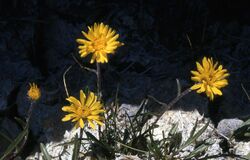Biology:Pyrrocoma uniflora
| Pyrrocoma uniflora | |
|---|---|

| |
| Scientific classification | |
| Kingdom: | Plantae
|
| (unranked): | |
| (unranked): | |
| (unranked): | |
| Order: | |
| Family: | |
| Tribe: | |
| Genus: | |
| Species: | P. uniflora
|
| Binomial name | |
| Pyrrocoma uniflora (Hook.) Greene
| |
| Synonyms | |
|
Haplopappus uniflorus | |
Pyrrocoma uniflora is a species of flowering plant in the aster family known by the common name plantain goldenweed.[1] It is native to western North America from central Canada to California to Colorado, where it grows in several types of habitat, including forest and meadows with alkali soils, such as those near hot springs. It is a perennial herb growing up to 40 centimeters tall, the stems reddish and usually with a thin to thick coating of woolly fibers. The lance-shaped, toothed leaves are usually woolly, the largest near the base of the plant reaching up to 12 centimeters in length. The inflorescence is a single flower head or a cluster of a few heads, each lined with woolly phyllaries. The head contains yellow disc and ray florets. The fruit is an achene which may be over a centimeter long including its long pappus.
There are two varieties of this species. The rare var. gossypina, sometimes called the Bear Valley haplopappus or Bear Valley pyrrocoma, is known only from the San Bernardino Mountains of California . This woolly sunflower-like plant is found in the meadows and the unique pebble plain habitat near Big Bear.[2]
References
- ↑ "Pyrrocoma uniflora". Natural Resources Conservation Service PLANTS Database. USDA. https://plants.usda.gov/core/profile?symbol=PYUN2. Retrieved 16 October 2015.
- ↑ California Native Plant Society Rare Plant Profile
External links
Wikidata ☰ Q7263768 entry

